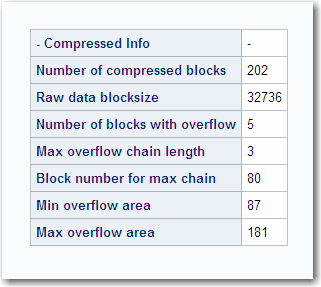COMPRESS= System Option
Specifies to compress SPD Engine data sets on disk
as they are being created.
| Valid in: | configuration file, SAS invocation, OPTIONS statement, System Options window |
| Default: | NO |
| Restriction: | cannot be used with ENCRYPT=YES |
| Engine: | SPD Engine only |
Details
When you specify COMPRESS=YES|BINARY|CHAR,
the SPD Engine compresses, by blocks, the data component file as it
is created. To specify the size of the compressed blocks, use the
IOBLOCKSIZE= Data Set Option when you create the data set.
To add padding to the newly compressed blocks, specify PADCOMPRESS= Data Set Option when creating or updating the data set. For more information,
see Compressing SPD Engine Data Sets.
The SPD Engine does
not support user-specified compression. If you are migrating a default
Base SAS engine data set that is both compressed and encrypted, the
encryption is retained, but the compression is dropped.
The CONTENTS procedure
prints information about the compression. The following example explains
the compressed info fields in the CONTENTS procedure output:
compressed block size
in bytes calculated from the size specified in the IOBLOCKSIZE= data
set option.
number of compressed
blocks that needed more space. When data is updated and the compressed
new block is larger than the compressed old block, an overflow block
fragment is created.
